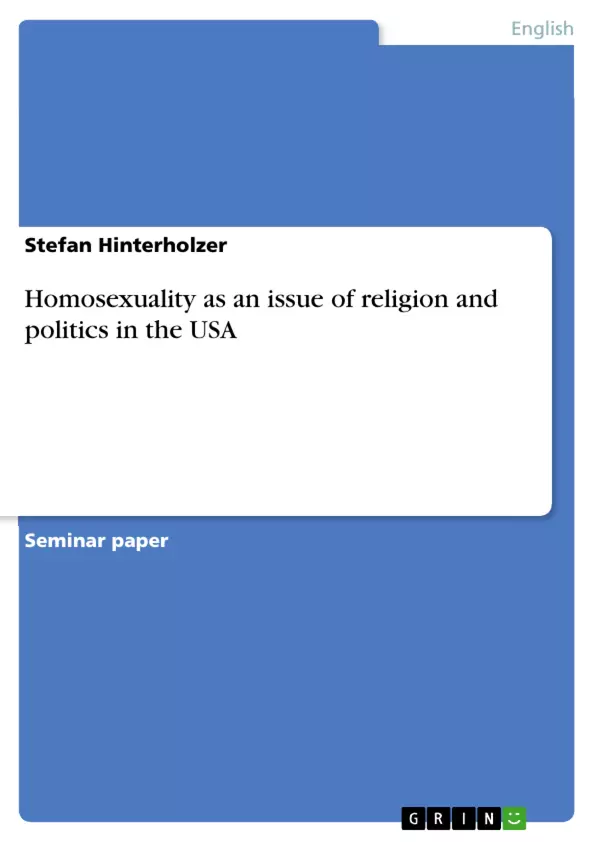The USA is a country that has a deeply-rooted religious tradition on the one hand and that separates religion and state like almost no other country on the other hand. However, the border between this religious consciousness in private and this strong secularism in public life often becomes blurry. There are certain issues like school prayer, sex education or abortion that are of an extreme importance for religious people. These make up a majority of the American society and a significant percentage of potential voters. Consequently, many politicians (including the current president George W. Bush) pay attention, react or even give in to this pressure in order to maintain a solid basis of voters that secures their political position.
An important issue in religion and politics in the USA is homosexuality and the related issue of same-sex marriage. Homosexuality has been being not tolerated and banned by most religious groups for a long time, but in our liberal society today many churches seem to develop a certain degree of tolerance towards homosexuals and to change their perspective on homosexuality. This makes the whole issue controversial since the perspectives in society also change. The major question in politics is whether homosexual couples should obtain the same rights (or at least some rights) as heterosexual couples through marriage or civil union or not. The importance of this issue also became clear for George W. Bush when he started the campaign for his re-election.
The aim of this topic is to prepare an introduction to the vast issue of the problematic relationship between religion and homosexuality and an overview of the positions of the American Christian churches towards homosexuality, to show the power of the religious groups (and the public opinion), to take a look at George W. Bush in his re-election campaign and to highlight the current legislation in the USA.
Inhaltsverzeichnis (Table of Contents)
- Introduction
- 1. The general conflict
- 2. American churches on homosexuality
- 2.1. Fundamentalist denominations
- 2.2. Conservative denominations
- 2.3. Mainline denominations
- 2.4. Liberal denominations
- 2.5. Post-denominational churches
- 3. The public opinion about homosexuality
- 4. The current legislation
- 4.1. General information
- 4.2. Massachusetts way to same-sex marriage
- 4.3. The Federal Marriage Amendment
- 5. George W. Bush and the issue of homosexuality
Zielsetzung und Themenschwerpunkte (Objectives and Key Themes)
This paper aims to explore the complex relationship between religion and homosexuality in the USA, focusing on the positions of American Christian churches towards homosexuality. It examines the influence of religious groups and public opinion, highlighting the role of George W. Bush during his re-election campaign and analyzing the current legislation surrounding this issue.
- The conflicting perspectives of religion and society on homosexuality
- The diverse stances of various denominations on the issue of homosexuality
- The impact of religious groups and public opinion on political decisions
- The political landscape surrounding same-sex marriage and related legislation
- The role of George W. Bush and his re-election campaign in the context of homosexuality
Zusammenfassung der Kapitel (Chapter Summaries)
- Introduction: This chapter introduces the topic of religion and politics in the USA, highlighting the inherent tension between deeply rooted religious traditions and the principle of separation of church and state. It emphasizes the importance of issues like school prayer, sex education, and abortion, which significantly influence the political landscape.
- 1. The general conflict: This chapter explores the historical and contemporary perspectives of various religions towards homosexuality. It examines the arguments against homosexuality, including the inability to reproduce and the perception of sinfulness. Additionally, it discusses the increasing tolerance towards homosexuality in recent decades, driven by factors like the sexual revolution, the homosexual rights movement, the growing understanding of the difference between homosexuality and paedophilia, scientific research, and secularization.
- 2. American churches on homosexuality: This chapter delves into the diverse positions of American Christian denominations regarding homosexuality. It examines the perspectives of fundamentalist, conservative, mainline, liberal, and post-denominational churches, highlighting their varying levels of acceptance and tolerance.
- 3. The public opinion about homosexuality: This chapter explores the changing public opinion on homosexuality in the USA, analyzing the impact of social movements, media representation, and individual experiences.
- 4. The current legislation: This chapter analyzes the current legal landscape surrounding homosexuality and same-sex marriage in the USA. It examines the general information, the Massachusetts way to same-sex marriage, and the proposed Federal Marriage Amendment.
Schlüsselwörter (Keywords)
This paper explores the key concepts of religion, politics, homosexuality, same-sex marriage, American Christianity, denominations, public opinion, legislation, and the role of George W. Bush. It examines the intersection of these themes within the context of the USA.
Frequently Asked Questions
How do American churches differ in their views on homosexuality?
Stances vary significantly across denominations: fundamentalist and conservative groups often reject it based on scripture, while mainline and liberal denominations have become increasingly tolerant and inclusive.
What is the relationship between religion and politics in the USA?
Despite a formal separation of church and state, religious voters form a powerful bloc. Issues like same-sex marriage and abortion are critical for politicians to secure their voter base.
What was George W. Bush's stance on same-sex marriage?
During his re-election campaign, Bush utilized the issue of same-sex marriage to appeal to religious conservatives, supporting measures like the Federal Marriage Amendment.
How did the legal landscape for same-sex marriage start in the US?
The paper highlights the "Massachusetts way," as Massachusetts was the first state to legalize same-sex marriage, sparking a national debate and legal challenges.
Why has public opinion on homosexuality changed in the US?
Factors include the sexual revolution, the gay rights movement, scientific research into sexual orientation, and a growing secularization of parts of American society.
- Arbeit zitieren
- Stefan Hinterholzer (Autor:in), 2006, Homosexuality as an issue of religion and politics in the USA, München, GRIN Verlag, https://www.grin.com/document/65853



